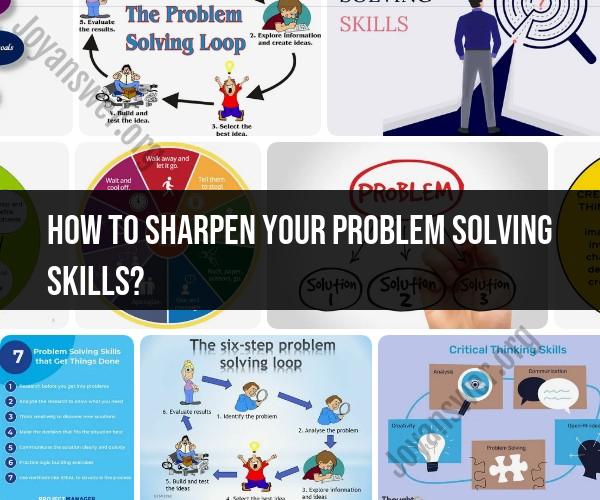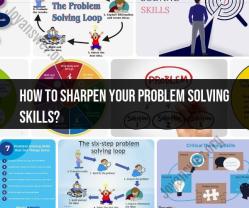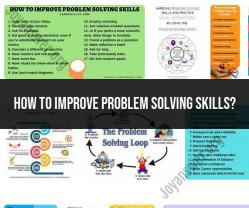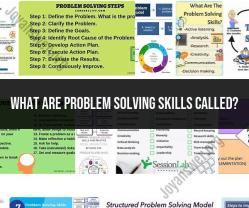How to sharpen your problem solving skills?
Sharpening your problem-solving skills involves proactive and deliberate efforts to improve your ability to address complex issues effectively. Here are steps you can take to enhance your problem-solving skills:
Develop a Growth Mindset:
- Embrace challenges and setbacks as opportunities to learn and grow. Believe in your capacity to improve your problem-solving abilities over time.
Identify Areas for Improvement:
- Reflect on your problem-solving experiences and identify specific areas where you'd like to improve. Is it creative thinking, decision-making, or analytical skills?
Set Clear Goals:
- Establish specific and achievable goals for enhancing your problem-solving skills. Define what success looks like for you in this context.
Practice Regularly:
- Seek out opportunities to solve problems. Engage in activities that require critical thinking, such as puzzles, brainteasers, or strategy games.
Learn from Others:
- Study how skilled problem solvers approach challenges. Read books, articles, or case studies that highlight effective problem-solving techniques. Observe and learn from mentors or colleagues who excel in this area.
Structured Problem-Solving Frameworks:
- Familiarize yourself with structured approaches like the scientific method, SWOT analysis, or decision trees. These frameworks provide a systematic way to address problems.
Diversify Your Knowledge:
- Broaden your knowledge and skills in various domains. A diverse skill set can provide you with multiple perspectives and tools for tackling problems.
Creative Thinking:
- Cultivate your creativity by engaging in creative activities such as art, music, or writing. Creative thinking can lead to innovative problem-solving approaches.
Practice Analytical Thinking:
- Strengthen your analytical skills by solving analytical problems or puzzles. Focus on logical reasoning and data interpretation.
Continuous Learning:
- Stay curious and open to new information. Learn about different industries, technologies, and methodologies that can inform your problem-solving efforts.
Collaborate and Seek Feedback:
- Collaborate with colleagues or peers when working on complex problems. Seek their input and constructive feedback to refine your solutions.
Set Up Challenges:
- Create personal challenges or projects that require problem solving. For example, tackle a DIY project, learn a new skill, or start a side project.
Time Management:
- Efficiently manage your time and prioritize tasks. Effective time management allows you to allocate more time and energy to problem solving.
Embrace Failure:
- Don't fear making mistakes or encountering failures. Each setback provides an opportunity to learn and improve your problem-solving skills.
Reflect and Iterate:
- After solving a problem, take time to reflect on your approach and the results. Consider what went well and what could have been done differently.
Stay Organized:
- Keep track of your problem-solving process, including notes, observations, and decisions. This organization can help you better analyze and evaluate your approach.
Stay Informed:
- Stay updated on industry trends, best practices, and emerging technologies relevant to your field. This knowledge can aid you in solving contemporary problems.
Stay Resilient:
- Maintain resilience and a positive attitude. Some problems may be challenging, but a resilient mindset helps you persevere.
By taking a proactive approach and consistently applying these strategies, you can sharpen your problem-solving skills and become a more effective and confident solver of complex challenges in your personal and professional life.






